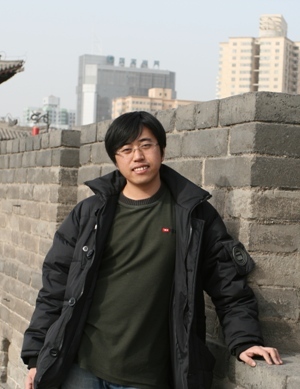Focus
Sick of the big smoke
By Huang Yuli (China Daily)
Updated: 2010-04-30 07:54
 |
Large Medium Small |
Soaring housing prices, hukou difficulties and the stress, pressure and competition of Beijing have many young white-collar workers dreaming of a simpler life. Huang Yuli reports.
An increasing number of young white-collar Beijingers want to leave the capital for secondary cities or their hometowns.
In a survey conducted by sohu.com of nearly 60,000 netizens, 82 percent said they had a desire to "escape" China's mega-cities, citing high housing price, difficulty in getting hukou (permanent residency) in cities such as Beijing and Shanghai, and the stress, pressure and competition that can come with living in major cities.
Another survey, recently released by Chinese job-hunting site Zhaoping.com, found that 81 percent of young people in Beijing, Shanghai, Guangzhou and Shenzhen would leave these mega-cities is they could get decent work elsewhere.
Housing prices have soared to such heights in Beijing that many Chinese couples can't afford to buy one when they get married (which tradition dictates they do). People living in the capital without a Beijing hukou (about 5 million, or 29 percent of the city's total population) according to the Beijing municipal government) face disadvantages in getting jobs, health care, education for their children and other social welfare.
Second-tier cities offer less pressure and lower costs of living. Moving back to parents' apartments in hometowns can eliminate the need to worry about income altogether.
"I used to think Beijing was the city of my dreams," said television news editor Li Hanjing in a Singapore-based Straits Times story.
Li, 33, moved here in 2004, but decided to leave for Hangzhou in Zhejiang province after visiting the second-tier city. She says she is more relaxed because of the slower pace of life in Hangzhou.
Second-tier cities, such as Hangzhou, Tianjin, Dalian and Shenyang, posted growth figures of around 16 percent in 2008, significantly higher than those of first-tier cities (8 percent to 12 percent), according to official figures, reported the Straits Times.
The higher growth in second-tier cities may be creating enough white-collar work opportunities to tempt young people considering leave first-tier cities. A report from www.51job.com, one of China's biggest job recruitment websites shows an increasing concentrations of pharmaceutical and bioengineering jobs in Nanjing, Hangzhou, Chengdu and Wuhan, corporate training and education jobs in Wuhan, Shenyang and Xi'an, and fashion and textile jobs in Hangzhou.
Experts expressed different opinions about whether this desire to leave first-tier cities will translate into any kind of significant migration.
"Major cities have advantages that are not replicated elsewhere - international exposure, better medical facilities and top-ranked universities. If you want these things, you need to live in Beijing, Shanghai or Guangzhou," said Cao Kaiyu, deputy editor-in-chief of In City magazine.
But other experts disagreed.
"Once second-tier cities start providing decent job opportunities, young people will, quite rationally, start moving there," said Li Guoqing, researcher at the Chinese Academy of Social Science.
I want to leave!
Wang "Xiaofu" (who did not want to give her real name), a website editor, came to Beijing 12 years ago from her hometown in Jingzhou, Hubei province to join the army.
The 29-year-old and her husband have done pretty well since their arrival, managing to pay off the mortgage on a large two-bedroom apartment inside the Fifth Ring Road and buy a Ford Focus. Despite all this, they recently decided to sell their home and move to Wuhan, the capital of Hubei province.
"It was not an impulse decision," Wang said, "I made up my mind on a trip to my hometown this Tomb-sweeping holiday."
When she returned home, Wang discovered that her father had been diagnosed with a liver disease and was in hospital.
"I felt dazed, sad and guilty that I couldn't be there at his bedside when he first found out," she said.
But she felt even worse when her baby daughter, who lives with Wang's parents, no longer recognized her. Wang said it broke her heart.
Wang gave birth to her baby daughter in the capital at the end of last summer. Her mother journeyed from Jingzhou to help her look after the child until the end of 2009.
The family then decided to allow the grandmother to continue looking after the baby in her hometown when they all returned for Spring Festival this year.
"When she didn't remember me, the idea of returning to Hubei gathered steam," she said.
A lack of a Beijing hukou was also an important factor. Neither she nor her husband had one, which meant her daughter would need to take her college entrance exam in Wang's or her husband's hometown.
"In that case, she would have hardly any chance to enter an elite university in Beijing, since outsiders need higher marks to enroll," Wang said.
"This made me feel insecure because we were not being treated like other citizens with a Beijing hukou."

Wang chose Wuhan to settle down in because it is the capital city of the province, has a good standard of education and a low cost of living. She said she was especially attracted by the city's household registration policy, which grants a Wuhan hukou to three family members, provided one of them purchases an apartment larger than 100 sq m for more than 500,000 yuan.
Wang said she would be able to buy at least two apartments in Wuhan after selling her apartment in Beijing. She plans to buy one in the city center, with a key school in the neighborhood for her family of three, and another smaller apartment for her parents close by.
"This will make me feel settled and safe," Wang said.
"No matter how hard I work in Beijing or how successful I become, I still don't feel like I belong here," she said.
Wang predicts the road back to Wuhan will still have its share of bumps. The couple currently makes around 16,000 yuan a month in Beijing, but she predicts their income fall to 6,000 yuan or even less in Wuhan.
But money is not the only issue, as they will need to start a new social circle.
"We know no more than five people there," Wang said.
"We will come back to Beijing to visit our friends, but settling down in this city is no longer a possibility," she said.
I choose to stay.
Yu Xinwei has no plans to leave Beijing any time soon. The 29-year-old from China's northeastern Jilin province is a research and development department manager at Beijing Jiangmin Technology Co, the biggest domestic anti-virus software company, and has been in the capital for 11 years.
He said the city provides opportunities and freedom that he wouldn't find elsewhere.
He came to the city in 1999 to attend the University of Science & Technology Beijing.
"My classes didn't start until September, but I insisted on coming a month earlier," he recalled.
"When my parents left my home in Beijing after a week, I pretended to be sad but was actually delighted. I was finally free."
Yu had trouble finding a job after his graduation, partly because it coincided with the SARS outbreak, which made many companies alter their recruiting schedules.
He had a job offer from a software company in Fuzhou. He visited the coastal city in southeastern Fujian province and liked it. But still he wavered on taking the offer, unable to leave Beijing so soon.
Eventually he chose to stay and wait for a job here.
Beijing draws the top companies and the top talent from across the country, making it a better place to develop a career, he said.
It also has a rich cultural atmosphere and a lot of entertainment options, he added.
But probably the most important factor in his decision to stay was that his college girlfriend, who graduated the same year he did, got a job with China Mobile in the capital and a Beijing hukou along with it.

The two rented an apartment and lived happily. In 2006 they bought an apartment near the East Fourth Ring Road.
But their relationship soured and they broke up. Yu moved into his company's dormitory accommodation.
Yu concedes things looked pretty bleak. Not only was his girlfriend gone but also he was losing a lot of money in the stock market.
But things turned around a couple years later and Yu cheered up when he started a website with some friends, www.taowan.com.cn, which is dedicated to transformer toys and movies.
"One thing I love about Beijing is that you can always find people who have the same interests as you and can do projects like this," said Yu.
He said his friends maintain the website in their spare time but hope to somehow turn it into a full-time job.
"It's a lot of work, but it's gratifying to pursue something you truly like," he said.
He now rents an apartment with his friends and has a new girlfriend, who works in Japan but will come back to China within a year.
"I am thankful to this city despite its dry weather, high housing prices and traffic jams," Yu said
"I'll only leave Beijing if I absolutely must," Yu said, "This city has seen me through ups and downs, and has sort become my home."









